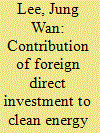|
|
|
Sort Order |
|
|
|
Items / Page
|
|
|
|
|
|
|
| Srl | Item |
| 1 |
ID:
192797


|
|
|
|
|
| Summary/Abstract |
This study analyses the impact of clean energy use on rural residents' subjective health outcomes (self-reported health status, health change, and discomfort) and objective health outcomes (bronchitis, asthma, medical expenditure, and fitness expenditure). Using an inverse probability-weighted regression adjustment estimator and the 2018 China Family Panel Studies data, we address the selection bias associated with clean energy use and estimate the treatment effects. The empirical results show that farmers using clean energy (liquid gas, natural gas, methane, solar energy, or electricity) as the primary cooking fuel report improved health, a lower probability of physical discomfort, and higher fitness expenditures than non-users. Clean energy use does not significantly affect self-reported health, the probability of having bronchitis and asthma, or medical expenditures. The health effects of clean energy use on men differ from those on women; they also vary across different economic strata. We also find that farmers’ decisions to use clean energy are positively associated with their educational level, household income, whether they rent farmland, and their happiness levels but are negatively related to their age, family size, whether they own real estate, and the ratio of elders in their household.
|
|
|
|
|
|
|
|
|
|
|
|
|
|
|
|
| 2 |
ID:
119823


|
|
|
|
|
| Publication |
2013.
|
| Summary/Abstract |
The paper investigates the contributions of foreign direct investment (FDI) net inflows to clean energy use, carbon emissions, and economic growth. The paper employs cointegration tests to examine a long-run equilibrium relationship among the variables and fixed effects models to examine the magnitude of FDI contributions to the other variables. The paper analyzes panel data of 19 nations of the G20 from 1971 to 2009. The test results indicate that FDI has played an important role in economic growth for the G20 whereas it limits its impact on an increase in CO2 emissions in the economies. The research finds no compelling evidence of FDI link with clean energy use. Given the results, the paper discusses FDI's potential role in achieving green growth goals.
|
|
|
|
|
|
|
|
|
|
|
|
|
|
|
|
|
|
|
|
|